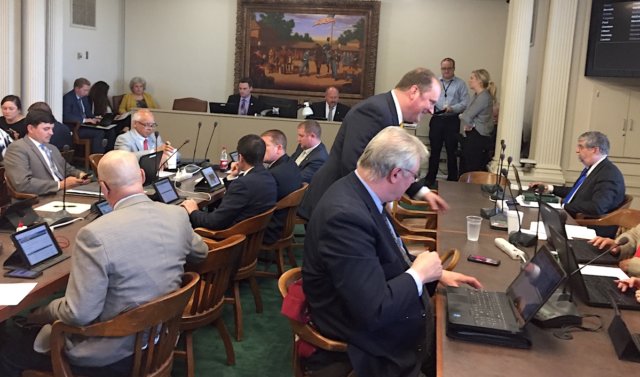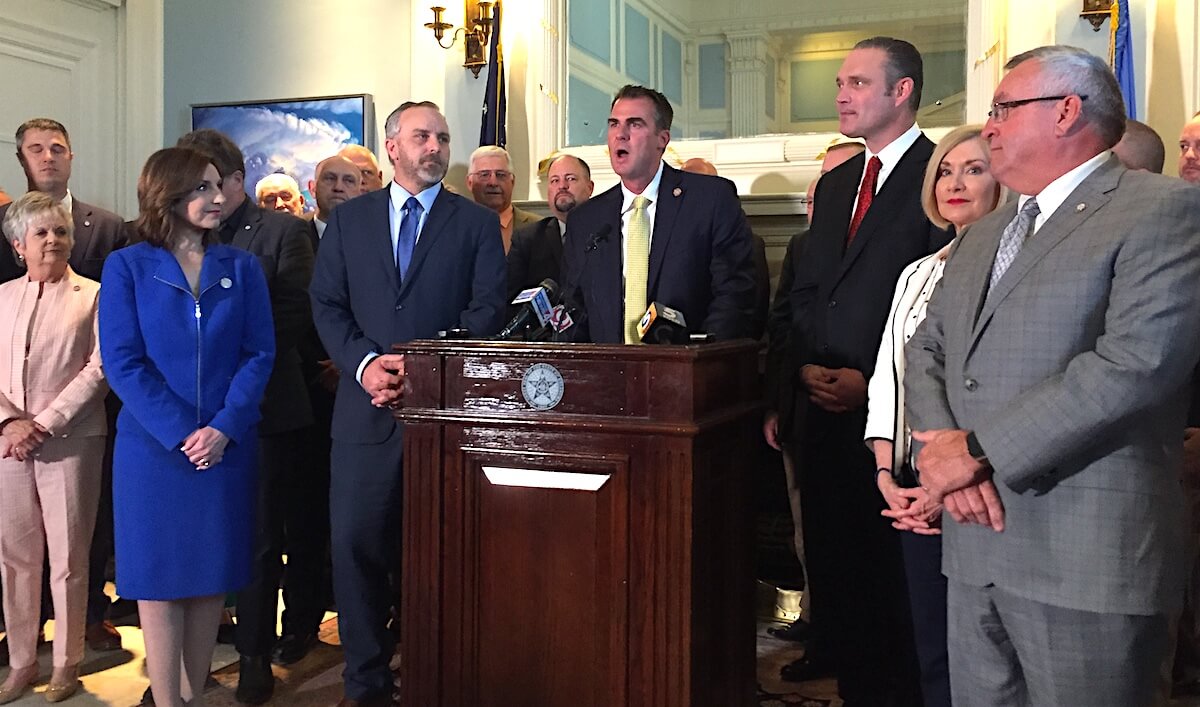

Members of the House Joint Committee on Appropriations and Budget spent almost two hours this afternoon advancing 11 measures related to the budget deal reached the day before that features $157.7 million new education appropriations and more than $200 million in savings.
The Senate version of the committee also moved the bills, which will head to their respective chambers. The measures would set up a new savings account for Medicaid funds, increase state employee pay and repeal a controversial “deadline” for education funding.
HB 2765 is the general appropriations bill setting levels for dozens of state agencies. During its presentation, House Minority Leader Emily Virgin (D-Norman) asked why Gov. Kevin Stitt’s office would receive a $2 million increase.
“He has brought to our attention that in the past there were certain items paid for through OMES,” Chairman Kevin Wallace (R-Wellston) said. “For transparency, he would like to move those back under the governor’s office.”
Stitt spoke at the start of session about the topic.
Rep. Forrest Bennett (D-OKC) questioned Wallace about the wisdom of not appropriating — or saving — more than $200 million when it could be spent on other investments and projects.
“There’s no time like starting saving like today,” Wallace said. “We know there will be a downturn in the future.”
HB 2765 passed committee 20-7.
House moves to repeal April 1 ‘deadline’ for funding #oklaed
Some lawmakers expressed surprise to see one education-related measure appear on the House JCAB agenda.
HB 2769 would repeal the punishment-free April 1 “deadline” for the full funding of common education. Lawmakers have critiqued the date as arbitrary and claimed schools would have received a lower amount of funding this year had budget leaders rushed to meet it.
“It’s something that needs to be repealed because we don’t have the full budget picture at the end of March,” Hilbert said during questions on the bill. “My personal opinion is it was all about politics and not about policy. It was something put in place that was never practical.”
Rep. Regina Goodwin (D-Tulsa) asked questions in favor of the April 1 deadline saying that “smart people” had implemented it previously. Rep. John Pfeiffer (R-Orlando) responded.
“When Republicans were in the minority, they put this into the law so they can yell at Democrats. And now it’s just the other way around,” Pfeiffer said. “Isn’t it true that this April 1 deadline has always been a political football?”
Rep. Monroe Nichols (D-Tulsa) pushed back on arguments that waiting to fund education until more details about the full state budget were available yielded more money for schools.
“I would reject the idea that voting ‘No’ on this means you wouldn’t support putting more money in education,” Nichols said. “I appreciate what is trying to be accomplished here, but the fact is that there’s a law out there that we don’t abide by so we are trying to change it instead of abide by it.”
Hilbert replied: “It isn’t good policy.”
Pfeiffer chimed back in, noting that lawmakers have told him that former Oklahoma Attorney General Scott Pruitt originally passed the April 1 deadline when he was in the Legislature.
An Oklahoma City Democrat, Bennett voted against the measure and jokingly yelled to his Republican colleagues, “I stand with Pruitt!”
The bill advanced 20-6.
State employee pay raise, FMAP stabilization, others advance
A slew of other measures also advanced from the simultaneous House and Senate JCABs.
HB 2767 would create FMAP Rate Preservation Fund which is intended to mitigate future adjustments to the federal Medicaid matching rate percentage if Oklahoma’s economy improves. Each state’s federal-state matching ratio fluctuates, sometimes meaning that the same amount of state appropriations yields different amounts of federal drawdown dollars each year.
RELATED
Budget deal: The full list of new #okleg appropriations by Tres Savage
“We are holding back $29.3 million in savings for the preservation fund,” Wallace said before Thursday’s meeting. “If we were to spend that money, it would be worth $86 million, so whenever we do spend it in health care to hold up the provider rates, we will be pulling federal dollars down above what we are investing in health care.”
“It’s really complicated, but I’ve told everybody it’s a really huge deal,” Wallace said, pointing out that he believes the money should also be referred to as savings. “So truly what we are adding to the savings line this year is more than $230 million.”
HB 2767 advanced by a 25-0 vote.
HB 2745 puts a $150,000 cap on the Ethics Commission Fund. The bill passed committee 21-6.
“They don’t need more than $150,000 in their revolving account,” said House JCAB Vice Chairman Kyle Hilbert (R-Depew) told committee members. “I know they would like more money, but this is historically looking at the amount of money they use. (…) It’s not as though we are punishing the Ethics Commission. This is something we have done to other agencies as well.”
- HB 2746 would create the Digital Transformation Program Revolving Fund. It passed 20-6.
- HB 2747 adjusts language related to the state’s Automated Clearing House, which deals with automatic pay stubs. It passed 27-0.
- HB 2748 modifies incentive-eligible entities under the Oklahoma Tourism Development Act. It passed 25-2.
- HB 2770 confirmed the salary schedule for court reporters.
HB 2766 repays the Oklahoma Department of Transportation for a short-term loan for ad valorem reimbursement. It passed committee 27-0.
HB 2768 repealed language related to what happens with additional revenue when the Constitutional Reserve Fund — known as the Rainy Day Fund. Wallace said a Senate bill passed in 2013 directed such monies to “spill over” into a Pension Preservation Fund, which has never received money because the RDF cap has not been hit in the years since. Wallace said GOP leaders now believe any additional money should be returned to the General Revenue Fund. It passed committee 19-7.
HB 2772 would implement the state employee pay raise bill. It passed 26-0.
The House committee also advanced three Senate bills:
- SB 1045 would initiate a $2-per-hour raise for 41 different employee classifications within the Oklahoma Department of Corrections. It advanced 25-0 from the House committee.
- SB 1047 would adjust language related to proceed percentages within the Oklahoma Lottery Commission. It advanced from the House committee 20-4.
- SB 1066 appropriates $2 million to the Oklahoma Indigent Defense System. It advanced from the House committee.
The Senate, meanwhile, simultaneously held its JCAB and advanced the same bills.
Background on #okleg FY 2020 budget deal
Wednesday, Republican leaders of the Legislature and Stitt announced a budget deal that includes a $157.5 million increase in common education appropriations and $200 million in savings. The deal was also revealed to include $28 million in new money for higher education, $18 million for Career and Technology Education and $37.7 million for public employee pay raises of up to $1,400.
Other details about new appropriations can be found here.
(Correction: This story was corrected at 8:42 a.m. Friday, May 17, to fix a typo that incorrectly noted the FMAP preservation fund amount. NonDoc regrets the error.)





















